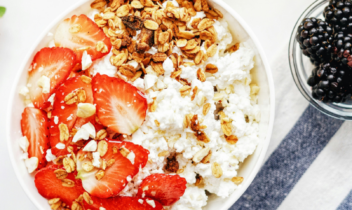TheBUZZ: Zinc can stabilize your mood?
WHAT THEY’RE SAYING
Zinc found in oysters, lentils, beans, and nuts can reduce hostility and depression.
WHAT WE KNOW
Zinc’s functions are multifaceted including cellular metabolism, immune function, protein synthesis, wound healing, DNA synthesis, and cell division. Zinc also supports normal growth and development during pregnancy, childhood, and adolescence and is required for proper sense of taste and smell.
Zinc is considered an essential mineral because it is not stored in the body. So getting adequate consumption of zinc through the diet is essential. Here’s how much zinc you need …
Recommended Dietary Allowances (RDAs) for Zinc
 |
|
Age
|
|
Female
|
|
Male
|
 |
|
1-3
4-8
9-13
14-18
19+
|
 |
3 mg
5 mg
8 mg
9 mg
8 mg
|
 |
3 mg
5 mg
8 mg
11 mg
11 mg
|
A wide variety of foods contain zinc. Oysters contain more zinc per serving than any other food, but red meat and poultry provide the majority of zinc in the American diet. Other good food sources include beans, nuts, certain types of seafood (such as crab and lobster), whole grains, fortified breakfast cereals, and dairy products.
Many Americans suffer from low zinc levels. One of the signs of zinc deficiency is mood swings (mental lethargy), therefore, new research has hypothesized that low zinc levels can be linked to a decreased mood.
HOW DO WE KNOW THIS?
A recent study in the European Journal of Clinical Nutrition supplemented 30 young women with multivitamins, multivitamins with 7 mg of zinc, or a placebo for 10 weeks. After the 10 weeks, the women who were supplemented with the additional zinc reported reductions in depression and anger. The study concluded that adequate zinc intake may be effective at reducing anger and depression.¹
Another randomized trial published in the American Journal of Clinical Nutrition supplemented 674 children (grades 1-4) with 10 mg of zinc, five (5) days per week for six (6) months. The study found that increased serum blood concentrations of zinc were associated with decreases in depression and anxiety. ²
Both of there studies were done with small population groups and further research needs to be done to determine the direct relationship between zinc and mood.
OUR ADVICE
For now … eat a balanced diet that focuses on fruits and veggies, including beans! By doing this, you’ll provide your body with all of the essential compounds (vitamins, minerals, antioxidants, phytochemicals, etc.) it requires to function optimally. Remember that the new Dietary Guidelines for Americans recommends eating two (2) servings of seafood per week as well as eating more beans—this will help meet your zinc recommendation!
As for your mood…a diet that supports a healthy lifestyle is going to promote a positive outlook on life too! Your clothes are going to fit better, you’ll have more energy, and you won’t feel guilty about what you’re eating; this formula can lead to improved mood as well.
Try our Salad Nicoise and Enchilada Rice recipes for meals rich in zinc!
¹ Sawada, T., K. Yokoi. “ Effect of Zinc Supplementation on Mood States in Young Women: A Pilot Study.” European Journal of Clinical Nutrition (2010); 64(3); 331-33.
² DiGirolamo, A., M. Ramirez-Zea, M. Wang, et al. “Randomized Trial of the Effect of Zinc Supplementation on the Mental Health Status of School-age Children in Guatemala.” American Journal of Clinical Nutrition (2010); 92(5); 1241-50.
|




